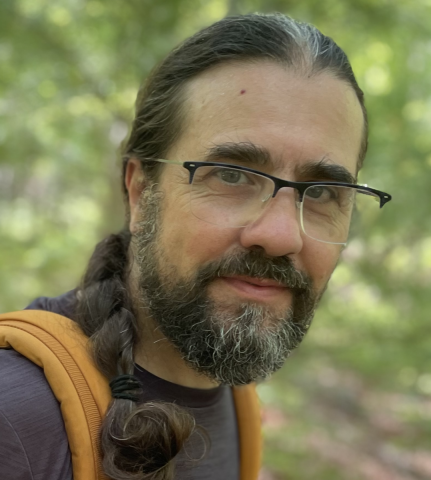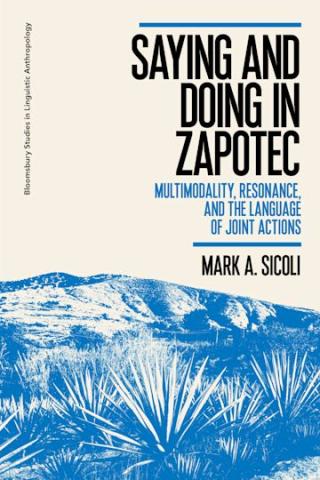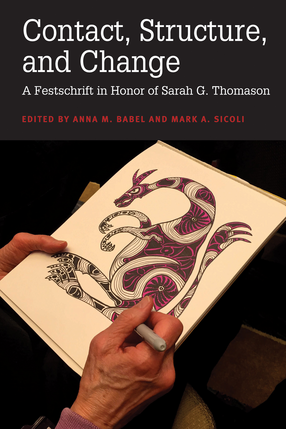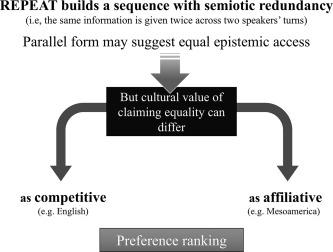Mark Sicoli
Ph.D. University of Michigan 2007
Specialties
Embodied Interaction, Video Analysis, Semiotics, Ethnography, Language in Human Evolution and Prehistory, Language Contact, Documentary Linguistics, Indigenous languages of the Americas: Zapotec, Chatino, Chinantec (Otomanguean: Oaxaca, Mexico), Nottoway (Iroquoian: Virginia, U.S.A)
My research trajectory has grown from an interdisciplinary education in anthropology and linguistics along with my fascination with the place of language in human sociality. This has led me to develop methods of multimodal interaction and video analysis of embodied interaction within my ethnographic and documentary work, and also to develop historical linguistic methods bearing on the study of prehistory. I teach courses on Language and Culture, Language Contact, Language in Human Evolution, Linguistic Field Methods, Native American Languages, and Multimodal Interaction and Video Analysis.
In my book Saying and Doing in Zapotec: Multimodality, Resonance, and the Language of Joint Actions., I integrate ethnography, video analysis, and grammatical analysis to study the way human action weaves language together with social life in a highland Zapotec community of Oaxaca, Mexico, based on a 50-hour video corpus of interactions built through participatory methods with community involvement, supported by the Max Planck Institute for Psycholinguistics and the National Endowment for the Humanities. Saying and Doing in Zapotec: Language and Joint Actions in a Oaxacan Village is about how language is shaped through everyday collaborations in the joint projects that build meaningful worlds. These projects include the managing of social relations, the achieving and repairing of intersubjectivity, and the coordination of action with material culture. The book is intended as a contribution to linguistic and anthropological theory, and as a rich description of language and social life in an Indigenous community of Mexico that can inform professional scholars and graduate students of language and culture, yet is written to be readable by advanced undergraduate students and scholars of other disciplines. My engagement is built with theory and methods that integrate talk, body techniques like gestures and eye gaze, and actions with material objects, in interactional, and moral ecologies of collaborative action.
I also maintain an active research program on the cultural evolution of language, working both to understand language as evolved, embodied, social-cognitive practices, and to interpret prehistory in the Americas through the material relations among Indigenous languages. This work integrates traditional methods of historical linguistics, with computational phylogenetic methods drawn from bioinformatics and applied to databases coding linguistic typology. I’ve published in this area on work with the Dene languages of North America, and the Yeniseian languages of Siberia, and am currently expanding the databases, with colleagues and student assistants, to include Eskimo and Aleut, and beyond this to other Indigenous languages of the American continents. In a narrower scope, I am working toward a book on the linguistic and cultural history of West Zapotec and its place in the emergence of one of the earliest state-level societies in the western hemisphere.
I conduct work in language documentation and am developing a dictionary of Lachixío Zapotec for scholarly use, and use by the community. I co-directed a language survey of 104 Zapotecan speaking towns in southern Mexico supported by the National Institute of Indigenous Languages of Mexico (INALI). For this project, I trained 23 native speakers of Zapotec and Chatino languages to apply a survey instrument to record and transcribe approximately 3000 utterances for each town to document grammatical constructions across the diverse language family. I then went on to direct the project, Preserving and Enhancing Access to the Survey of Zapotec and Chatino Languages, funded by the National Science Foundation, Documenting Endangered Languages program. This project produced a publically available online archive of the results of the Zapotec and Chatino Survey. I was co-principle investigator on the project Documenting Whistled Speech among Chinantecans, also funded by the National Science Foundation. This project produced both a language archive of video recorded, transcribed, and translated, conversations in whistled speech, and a public television documentary on whistled speech and language endangerment in Oaxaca. I am dedicated to decolonizing linguistics and anthropology, and am working to develop opportunities for speakers of indigenous languages in Mexico and the US to build capacity in linguistics and anthropology, and to learn new ways of thinking about language and culture from Indigenous scholars through these engagements.
Since spring 2020 I have worked with the Language Committee of the Nottoway Tribe of Virginia for ongoing language revival. In Spring 2021 I co-taught "Language Revival in the Eastern Tribes" with Nottoway citizens Benaiah Walters and Dr. Denise Walters. With UVA undergraduate and graduate students we used comparative linguistic methods to reconstruct aspects of Nottoway in comparison with Tuscarora and other Iroquoian languages.
Selected Publications
Books
(2020) Sicoli, Mark A. Saying and Doing in Zapotec: Multimodality, Resonance, and the Language of Joint Actions. London: Bloomsbury Press.
(2021) Babel, Anna M. and Mark A. Sicoli (Eds.). Contact, Structure, and Change: A Festschrift in Honor of Sarah G. Thomason. Ann Arbor: Maize Books.
Articles
2021 Brown, Penelope, Mark A. Sicoli, and Olivier Le Guen. "Cross-speaker repetition and epistemic stance in Tzeltal, Yucatec, and Zapotec conversations" Journal of Pragmatics 183(1):256-272
2020 Sicoli, Mark A. “Modality, Multimodality” Invited, peer reviewed entry for the International Encyclopedia of Linguistic Anthropology. Wiley.
2018 Sicoli, Mark A. and Matthew Wolfgram. “Charles Sanders Peirce and Anthropological Theory” Oxford Bibliographies in Anthropology. DOI: 10.1093/OBO/9780199766567-0187. Co-conceived and developed with equal authorship. (Archived preprint 2236 reads on researchgate.net)
2018 Dobrin, Lise M. and Mark A. Sicoli. “Why Cultural Meanings Matter in Endangered Language Research.” In Bradley McDonnell, Andrea L. Berez-Kroeker & Gary Holton (eds.), Reflections on Language Documentation 20 Years after Himmelmann 1998. (Language Documentation & Conservation Special Publication 15.) Honolulu: University of Hawai‘i Press. Equal authorship. (2 citations)
2018 Majid, Asifa, Seán Roberts, Ludy Cilissen,…Mark A. Sicoli, and Stephen C. Levinson. “The Differential Coding of Perception in the World’s Languages” Proceedings of the National Academy of Sciences 115(45): 11369–11376. Iterated dialogues during development of research and writing, Sicoli contributed data from fieldwork, read and commented on drafts.
2016 Sicoli, Mark A. “Repair organization in Chinantec whistled speech” Language 92(2): 411-432.
2016 Sicoli, Mark A. “Formulating place, common ground, and a moral order in Lachixío Zapotec” Open Linguistics, 2: 180-210.
2015 Sicoli, Mark A. “Agency and verb valence in Lachixío Zapotec” Valence changes in Zapotec: Synchrony, Diachrony, Typology, edited by Natalie Operstein & Aaron Sonnenschien, 191-212. Amsterdam: John Benjamins Publishing Company, Typological Studies in Language Series.
2015 Sicoli, Mark A., Tanya Stivers, N.J. Enfield & Stephen C. Levinson. “Marked initial pitch in questions signals marked communicative function.” Language and Speech 58(3) 204-223. doi: 10.1177/0023830914529247
2015 Sicoli, Mark A. “Voice Registers” The Handbook of Discourse Analysis, Second Edition, edited by Deborah Tannen, Heidi E. Hamilton, and Deborah Schiffrin, 105-126. Chichester, UK: John Wiley & sons, Ltd.
2014 Sicoli, Mark A. “Ideophones, Rhemes, Interpretants” Pragmatics and Society 5(3): 445-454.
2014 Sicoli Mark A, Holton Gary. “Linguistic phylogenies support back-migration from Beringia to Asia.” PLoS ONE 9(3): e91722. doi:10.1371/journal.pone.0091722
2011 Sicoli, Mark A. “Agency and ideology in language shift and language maintenance.” Ethnographic contributions to the study of endangered languages: A linguistic anthropological perspective, edited by Tania Granadillo and Heidi Orcutt-Gachiri, 161-176. Tucson: University of Arizona Press.
2011 Shayan, Shakila, Özgë Öztürk, & Mark A. Sicoli “The thickness of pitch: Crossmodal iconicity in three unrelated languages; Farsi, Turkish and Zapotec.” Senses and Society 6(1).
2010 Sicoli, Mark A. “Shifting voices with participant roles: Voice qualities and speech registers in Mesoamerica.” Language in Society 39(4): 521-553.
2005 Sicoli, Mark A. “Oto-Manguean languages.” Encyclopedia of Linguistics, edited by Philipp Strazny, 797-800. New York: Fitzroy Dearborn.
2000 Sicoli, Mark A. “Loanwords and contact-induced phonological change in Lachixío Zapotec.” Proceedings of the 25th annual meeting of the Berkeley Linguistics Society. Berkeley: Berkeley Linguistic Society.



